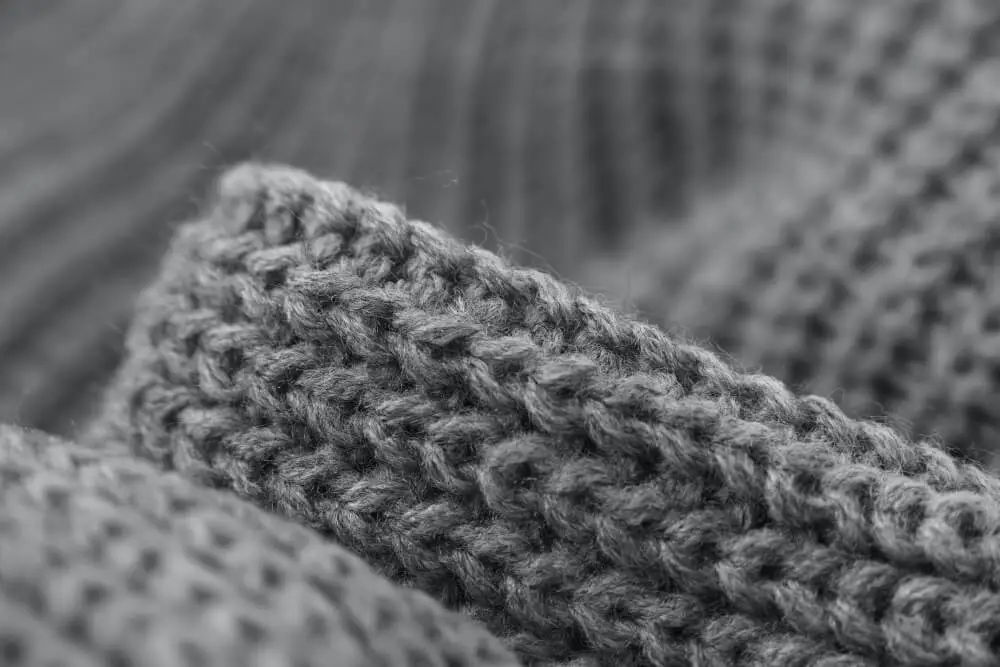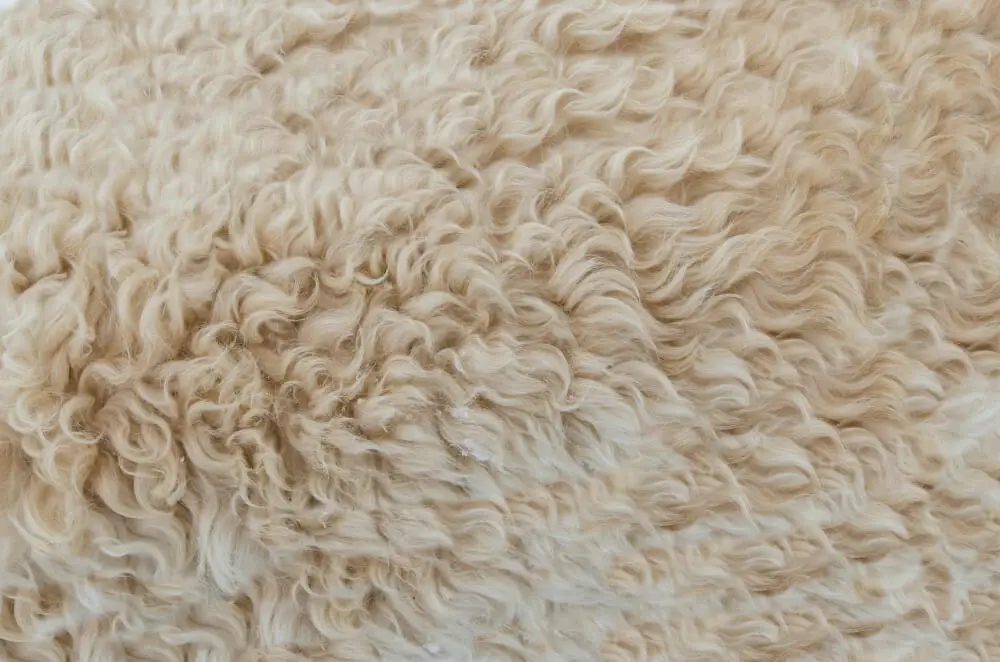One of the great things about wool is that it resists odors and doesn’t trap odor. This makes it great for undergarments during backpacking or camping trips and makes it so you don’t have to wash that delicate wool sweater very often. But, why is wool odor-resistant?
Wool is breathable and wicks sweat off the body which prevents odor-causing bacteria from building up. It is also naturally antibacterial to further prevent bacteria and it doesn’t trap odors in the fibers like some other synthetic fabrics.
Wool has some super cool science behind it, so let’s jump in and discover how wool can be odor resistant.
Why is Wool Odor Resistant?

Wools odor-resistance comes from four main factors. It is moisture-wicking, it doesn’t trap in odors, it’s breathable, and it’s naturally antibacterial.
Although wool won’t trap in the body odour smell, if wool gets wet it will smell like sheep. If you wear wool often, you might call this the merino wool smell. Personally, I love the smell of sheep, but it’s not for everyone.
If you don’t like the smell of sheep, then a wool garment is probably not something you should wear if you’re planning on getting wet.
Now, let’s talk about the four properties of wool that make it resist odors.
Moisture Wicking
Wool can wick moisture meaning it quickly absorbs any sweat or liquid off your skin. This not only prevents you from getting cold and clammy but also prevents bacteria from building up.
Certain types of bacteria are a big reason why things start to smell, they’re not harmful in small doses but the smell is unpleasant.
Bacteria can form if your sweat, or any liquid, gets trapped between an outer layer and your skin. The body heat you produce gives the bacteria already present a nice, warm, cozy spot to hang out with their friends.
Keeping liquid out of this warm layer prevents these bacteria from being able to multiply which is one of the ways that wool can prevent odors.
Breathable

Another reason wool is odor resistant is similar to moisture wicking. Wool is a breathable fabric which means it has a cooling effect that helps keep you cool in warm weather.
This breathability allows the moisture to evaporate off your skin more quickly and it helps dry the moisture that the wool already absorbed.
Since some of the moisture is evaporating, this means that there is less moisture that the wool has to wick off your skin.
This not only further prevents bacterial growth but also keeps your wool garment from becoming completely soggy and saturated with liquid which is just the worst.
Antibacterial Properties
This is probably the coolest fact about why wool is odor-resistant, wool has an antibacterial effect.
Human sweat has bacteria in it which is perfectly natural and healthy. But, they can smell. When wool absorbs your sweat, it prevents those bacteria from multiplying.
As we already discussed, the main reason your clothing has unpleasant odors is because bacteria form between your skin and your outer layer.
According to a study done by the National Institute of Health, wool prevents bacteria by forming a bond with the bacteria. This bond traps the bacteria in the wool fiber which completely stops it from multiplying.
How cool is that? I learn something new about wool all the time and it always blows my mind. There are some other cool facts about wool when it gets wet, check out my other post to learn about them.
Doesn’t Trap in Odors
This last reason wool is odor-resistant combines all other reasons.
Wool doesn’t trap in odors like some other synthetic materials. This is because it is breathable which helps the liquid absorbed by the wool dry faster.
It also naturally prevents the bacteria from multiplying after it’s absorbed the liquid which keeps the smell from getting worse.
Both of these characteristics are unique to wool and other natural fibres. This means, unfortunately, synthetic fibers such as acrylic and polyester fabrics get smelly much faster than wool.
Now that we’ve covered how wool is odor-resistant, let’s talk about some other benefits of wool garments.
Benefits of Merino Wool Garments

Wool sweaters, base layers and other merino wool items are great for just about every scenario.
But, what makes merino wool clothing so awesome? There are five main benefits to merino wool gear: breathability, insulation, versatility, water resistance, and odor resistance.
These benefits are also present in other wool products such as blankets and rugs.
If you’re interested in how wool compares to other natural fibers, I have posts comparing wool to alpaca and cashmere.
1. Breathability
Unlike synthetic fabrics, wool is very breathable. This property means you can wear a merino wool t shirt in the peak of summer and be perfectly comfortable.
The breathability allows your sweat to evaporate which gives the cooling effect your body needs when it starts to heat up.
Breathability also helps keep odors down by drying up your sweat which causes the odorous bacteria.
2. Insulation
Wool is an amazing insulator. It helps trap in your body temperature which keeps you warm in cold weather.
Wool is so good at insulating because it’s able to trap lots of air between the merino fibers. Air is one of the best insulators which helps the wool keep you warm.
It also helps prevent heat loss by trapping your body heat against your skin which is exactly what you want in a warm winter layer.
3. Versatility
Wool is super versatile, meaning you can wear it in every season. That means you can wear a heavy sweater in the winter and a merino wool t-shirt in the summer and be comfortable either way.
This is because wool is good at insulating for the winter months, but it’s also able to keep you cool in the summer by being breathable.
Pair that with the fact that it’s odor-resistant, and you can’t go wrong with wool garments.
4. Water Resistance
Another unique aspect of wool garments is that they’re water resistant. Meaning they will stay drier for longer than other materials.
Wool is also able to absorb 30% of it’s weight in water before it becomes fully saturated.
This means that, even if the wool starts to get wet, you won’t feel wet because the wool will not be fully saturated. This makes it for both inner and outer garments.
5. Odor Resistance
And, last but not least, wool is odor resistant which means you can wear it for a long time without having to wash it.
This makes it ideal for hiking and camping trips because it will prevent the body odor smell without needing to wash it.
And, because it’s naturally anti-bacterial, it can help keep you clean and smelling fresh for longer as well.
With all these benefits, wearing wool garments is a good option for any occasion.
Related Questions
Can You Put Wool in the Dryer?
Generally, no, you should not put wool in the dryer unless it is superwash wool or labeled as dryer safe. Wool should be laid flat to dry or draped over a drying rack. If wet wool is put in a hot cycle of the dryer it could felt and shrink. For more details about putting wool in the dryer, check out my other post here.
Does Wool Stink When Wet?
Wool can smell when wet, but it smells like lanolin which is a natural waxy substance produced by sheep to protect the wool. Some people don’t mind the smell, some can’t stand it, and some actually like it. So, it’s mostly personal preference if you think wool smells back when it’s wet.

